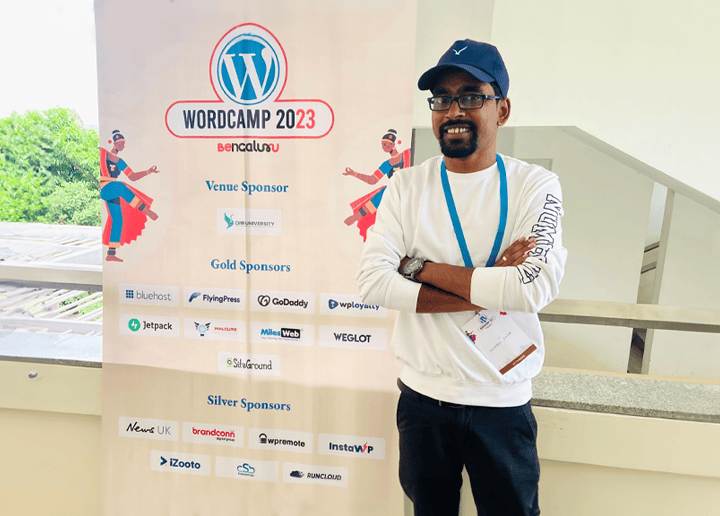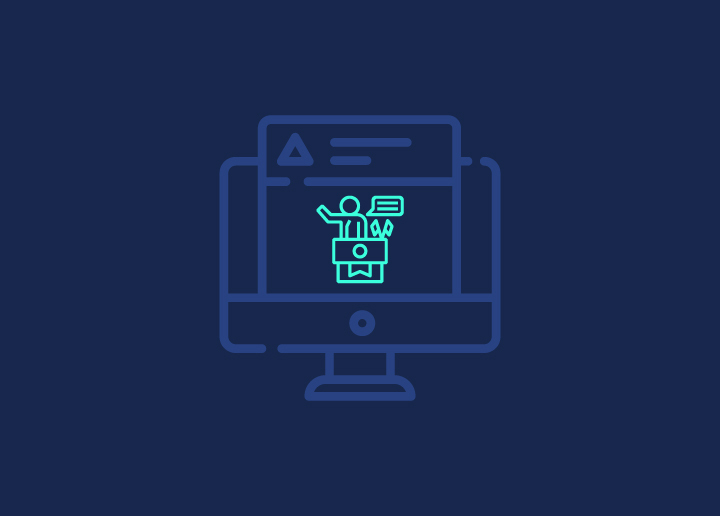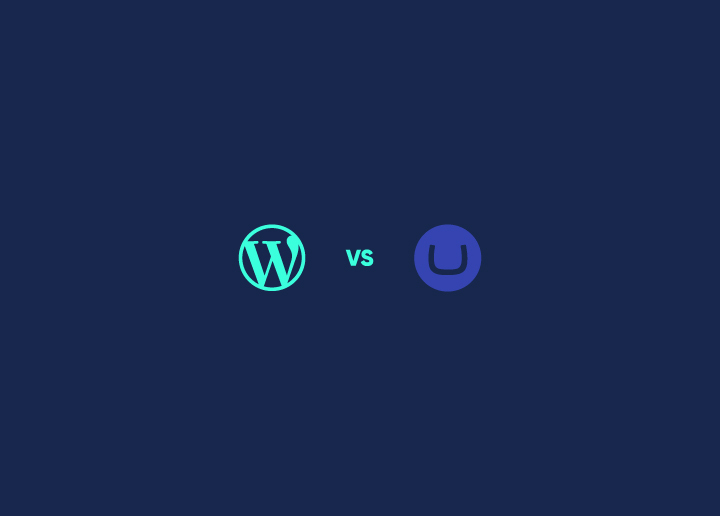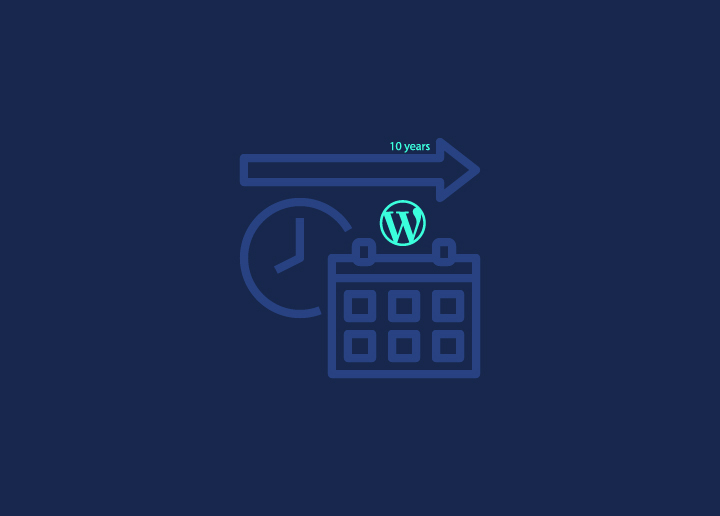WordPress is poised to maintain its CMS market dominance, underpinned by a strong community, continuous feature enhancements, and robust multilingual support for better global accessibility. Envisioning the future of WordPress in the next ten years is more than just curiosity; it’s a strategic foresight that businesses need. As such, this article strips away the fluff and dives straight into the core of WordPress’s bright future – a blend of innovation, accessibility, and a global community’s touch.
Contents
ToggleRecap of WordPress Evolution
WordPress, founded in 2003, has evolved remarkably, transforming from a simple blogging platform into a versatile content management system (CMS). This journey is marked by several key milestones highlighting its technological advancements and the robust community that propels its growth.

Inception and Early Years (2003-2007)
Matt Mullenweg and Mike Little founded WordPress as a user-friendly platform for bloggers. The release of version 1.0 in 2004 marked its official debut. The introduction of themes and plugins laid the foundation for customization, allowing users to personalize their websites beyond basic blogging functionalities.
The Rise of Themes and Plugins (2008-2012)
The WordPress Theme Directory, launched in 2008, provides users with a repository of themes for easy installation. The Plugin Directory followed suit, enabling users to enhance functionality with various plugins. The community-driven nature became evident as developers worldwide started contributing themes and plugins, fostering innovation and variety.
Gutenberg and Block-Based Editing (2017-2021)
The introduction of the Gutenberg editor in WordPress 5.0 (2018) was a significant step. This block-based editor revolutionized content creation, offering a more intuitive and flexible editing experience. The Gutenberg project, backed by extensive community feedback, exemplified WordPress’s commitment to user-driven improvements.
Increased Focus on Security (2015-2023)
WordPress intensified its focus on security by addressing vulnerabilities through regular updates and collaboration with security experts. Community discussions and educational efforts emphasized the importance of best security practices for users and developers alike.
Read: Ultimate WordPress Security Guide For 2024
Future of WordPress as a Content Management System
Several factors have contributed to WordPress’s transformation from a mere blogging platform into a flexible and robust content management system. These include:
- Its talented community of WordPress developers
- Continuous enhancements in its features and functionalities
- An open-source ethos that promotes innovation and shared learning.
WordPress Market Share and Usage
Currently, WordPress holds a commanding 62.9% market share of all websites globally. This is no small feat for a platform that started as a simple blogging tool. Its intuitive interface and versatility have made it an attractive choice for both amateurs and professionals who want to build a website. Given its success, WordPress will likely maintain its dominance in the CMS market, introducing new features along the way.
Related: Top 50 Most Notable And Inspiring WordPress Websites
Latest WordPress Version
The latest version of WordPress, 6.4, promises to introduce advanced features and improved performance. Enhanced accessibility is a major focus as well, making the WordPress dashboard more user-friendly for all individuals. With each update, WordPress continues to evolve, offering more than just a simple blogging platform but a comprehensive tool for content creation, including improvements in the WordPress core.
Enhanced User Experience for Non-Technical Users
WordPress has significantly improved its platform’s intuitiveness and user-friendliness for non-technical users. The Gutenberg block editor, for instance, has been enhanced to facilitate:
- The selection of appropriate templates
- Incorporation of various font options
- Highlighting important points with suitable colors
- Integration of custom CSS.
These improvements make it easier for users to create and customize their websites, even when working with Google Docs. They even allow non-technical users to fully participate in the digital world.
Partner With Us To Launch Your Next WordPress Website!
Let our team of WordPress experts create a stunning website for you. From website design to development, we’ve got you covered at revolutionary prices.
Advanced Custom CMS Features
WordPress plans to introduce advanced custom CMS features, offering even greater flexibility and customization as it continues to evolve. The Gutenberg editor, intrinsic to WordPress, underpins these advancements, providing improved layout flexibility and creativity and easing the creation of complex page layouts.
Read: Benefits Of Custom WordPress Website Design
Block-Based WordPress Development
The evolution of block-based development in WordPress continues with the enhancement of the Gutenberg block editor. Developers can expect advanced features that simplify the creation of intricate layouts and designs. The emphasis on reusable blocks will promote website consistency, streamlining the development process and fostering a standardized design approach.
Automated Site Maintenance
AI-driven processes will empower automated site maintenance in 2024. These processes include automatically detecting and installing updates for WordPress core, themes, and plugins. This ensures that websites are up-to-date, minimizing the risk of security vulnerabilities. Moreover, predictive issue resolution, facilitated by AI algorithms, will proactively identify and resolve potential website issues before they impact the user experience.
Related: Best WordPress Maintenance Service Providers
Expansion of Multilingual Support
Committed to serving a global audience, WordPress is improving its multilingual support. Whether it’s translating content into different languages or managing multilingual content, WordPress is set to make these processes more seamless for its users. The integration of multilingual support is anticipated to occur sometime around 2024 or 2025, further cementing WordPress’s position as a truly global platform.
Themes and Plugins: The Future of WordPress Extensibility
The future of WordPress extends beyond the core platform to its themes and plugins, playing a key role in its extensibility. AI-enhanced themes, new plugin development trends, and improved security are just a few examples of how these elements are evolving to meet the needs of an increasingly digital world.
Emergence of AI-Enhanced Themes
AI will revolutionize website design on WordPress by automating theme personalization. AI algorithms will dynamically customize website themes by analyzing user behavior, preferences, and interaction patterns. Thus, ensuring a highly personalized and engaging user experience. Additionally, smart content recommendations driven by AI will be pivotal in enhancing user engagement by providing tailored suggestions based on individual user data.
Read: Find The Best Financial WordPress Themes
Plugin Development Trends
In 2024, plugin development trends are characterized by a shift toward cutting-edge technologies and architectures. Developers are increasingly integrating plugins with headless WordPress setups, embracing serverless architectures for scalability, and adopting GraphQL for efficient data fetching. Artificial Intelligence (AI) is pivotal in enhancing plugins, offering content recommendations and user behavior analysis capabilities. Microservices architecture is also gaining traction for modular and independent plugin components.
Security Advancements in Plugins
Security remains a top priority, with plugins implementing advanced encryption and authentication mechanisms. With features such as restricting login attempts, utilizing Web Application Firewalls (WAF), and eliminating unused themes and plugins, WordPress is taking the necessary steps to protect its users and their data. Blockchain integration is also explored for secure data storage and transparency. These security enhancements are significant in maintaining the trust and confidence of millions of website owners worldwide.
The Future of WordPress: Rise of Headless WordPress
Headless WordPress is a noteworthy advancement in the digital sphere, offering a more agile and secure web content management system. By separating the frontend from the backend and connecting through an API, Headless WordPress enhances security, making it challenging for hackers to compromise web content. With its ability to seamlessly integrate with contemporary web technologies, Headless WordPress is set to revolutionize how we manage and deliver content online.

Integration With Modern Web Technologies
Headless WordPress enables the creation of a highly responsive frontend using JavaScript and connecting it to the backend through REST API. This allows for secure data exposure from WordPress to mobile apps, enabling the apps to access and interact with WordPress data in JSON format securely. Integrating modern web technologies also opens new possibilities for creating more flexible and powerful platforms.
Opportunities for eCommerce Solutions
The emergence of Headless WordPress offers numerous prospects for eCommerce solutions. By incorporating contemporary web technologies, Headless WordPress provides smooth online shopping experiences, creating new possibilities for eCommerce platforms.
In addition, WordPress will strengthen its position as an eCommerce platform with WooCommerce (now WOO) and more seamless integration of payment gateways. This integration aims to simplify the setup and management of online transactions. Moreover, AI-driven tools for personalized shopping experiences will be implemented, enhancing user satisfaction and potentially increasing sales.
Read: WooCommerce Vs Shopify: Who Wins
Mobile First: WordPress’s Commitment to Mobile Devices
WordPress is adopting a mobile-first approach as the shift towards mobile intensifies globally. Recognizing the growing importance of mobile devices in accessing and managing web content, WordPress focuses on developing native mobile apps and enhancing its accessibility standards for a seamless mobile experience.

Native Mobile Apps Creation
WordPress is facilitating the easy creation of native mobile apps for Android and iOS using the REST API and frameworks like React Native. This allows for secure access and interaction with WordPress data, enabling users to manage their websites on-the-go through WordPress development. With these advancements, managing a WordPress site from a mobile device has never been easier.
Enhanced Accessibility Standards
Ensuring a seamless and inclusive experience for all users on mobile devices is a key focus for WordPress. In line with this commitment, WordPress is enhancing its accessibility standards, providing mobile-optimized themes to ensure a smooth and seamless mobile experience. These advancements are crucial in making WordPress accessible to everyone; regardless of their device or abilities.
Read: ADA Compliance WordPress: Making Your Website Compliant
The Global WordPress Community and Open-source Ethos

WordPress’s evolution is profoundly shaped by its vibrant and diverse community. This global community, consisting of developers, designers, users, and contributors worldwide, actively participates in the platform’s growth and enhancement.
- Open Source Philosophy: WordPress’s commitment to open-source principles has empowered developers globally to freely contribute code, themes, and plugins. The open-source nature ensures transparency and accessibility.
- Global WordCamps and Meetups: WordCamps, organized by local communities worldwide, provide opportunities for WordPress enthusiasts to meet, share knowledge, and contribute to the platform’s development. Local meetups foster collaboration and problem-solving within smaller, geographically specific communities.
Related: Recapping WordCamp US 2023
- Community Contributions: The Theme Review Team, Plugin Review Team, and other contributor groups exemplify how volunteers play a crucial role in reviewing and enhancing the quality of themes and plugins available to users. Check out Seahawk’s contribution to Five for the Future.
- Feedback-Driven Development: The iterative development of features like Gutenberg is a testament to WordPress’s commitment to user feedback. Regular updates and improvements are made based on community suggestions.
Volunteer Developers and Global Collaboration
Volunteer developers are fundamental to WordPress’s growth. By contributing content and organizing events, they help shape the platform’s future. Their contributions are not only beneficial to the WordPress community but also provide them with opportunities for professional growth and career advancement.
Fostering a More Inclusive and Diverse Community
In addition to its dedication to innovation and growth, WordPress is equally devoted to promoting an inclusive and diverse community. By promoting diversity, equity, inclusion, and belonging as core principles, WordPress is creating an environment that appreciates diverse communities and guarantees equal opportunities for all.
Future of WordPress: Leveraging Emerging Technologies
WordPress continues to evolve in tandem with the changing technologies. By leveraging emerging technologies like augmented and virtual reality and blockchain applications, WordPress is setting the stage for a new era of web development.
Augmented and Virtual Reality Experiences

Augmented and virtual reality technologies are leading the charge for immersive and interactive content in WordPress. By simulating the in-store experience for users, facilitating customization and personalization, and providing a visually engaging experience, these technologies are set to revolutionize the user experience on WordPress websites. WordPress developers can also expect user-friendly AR/VR content editing tools, making these technologies more accessible and encouraging their widespread adoption.
Learn: Best Interactive Websites Inspiration
Blockchain Applications

Blockchain technology carries significant potential for major changes in the WordPress ecosystem. WordPress will explore the integration of blockchain technology to enhance content verification. This includes ensuring the authenticity & integrity of content through a transparent and tamper-proof record of changes. Additionally, the exploration of decentralized content distribution on the blockchain will contribute to making websites more resilient to centralized control and censorship.
Voice-Enabled WordPress Interfaces
In the coming year, voice-enabled interfaces will become integral to WordPress. This involves optimizing websites for voice search and making content more accessible to users relying on voice-activated devices. Furthermore, voice-activated commands will allow users to execute various tasks within the WordPress interface, providing a more convenient and hands-free content management experience.
Summary
In conclusion, the evolution of WordPress stands as a testament to the effectiveness of community-driven development. From a blogging tool to its current status as a global CMS leader, WordPress’s journey has been marked by inclusivity, collaboration, and a dedication to meeting the diverse needs of its users.
The exploration of the future of WordPress has revealed a dynamic and evolving platform that continues to lead the way in web development. From headless WordPress to its commitment to mobile devices and emerging technologies, WordPress is paving the way for a new era of digital experiences. Additionally, the vibrant community surrounding WordPress continues to propel its evolution, ensuring it remains a dynamic platform for the next decade and beyond.
Future of WordPress FAQs
Does WordPress have a future?
Yes, WordPress will continue to evolve and become easier to use, which will likely keep it relevant in the near future. With the introduction of advance block editors like Gutenberg, the platform can become even more user-friendly.
Is WordPress still relevant in 2024?
Yes, WordPress is still relevant in 2024, as it powers over 43.1% of all websites. This makes it the most popular content management system globally.
How long will WordPress last?
WordPress is designed to last for a long time, and its co-founder expects it to still be going strong even a century from now.
What is Headless WordPress, and why is it significant to the future of WordPress?
Headless WordPress is significant to the future of WordPress because it allows for the creation of a dynamic and secure front-end using JavaScript while connecting to the backend through REST API for enhanced web content management. This provides a more resilient and agile web content management system, making it difficult for hackers to compromise web content.
How are AI-enhanced themes and new plugin development trends shaping the future of WordPress sites?
AI-enhanced themes are enhancing user experiences on WordPress with more adaptability and intuitiveness. New plugin development trends are also shaping the future of plugin development with diverse strategies and the rising interest in headless WordPress solutions.















